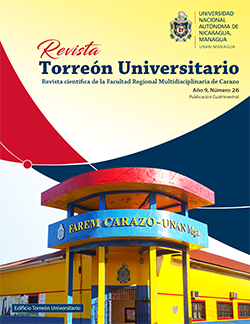The harmonization of the Education majors in Nicaragua: policy and perspectives
DOI:
https://doi.org/10.5377/torreon.v9i26.10258Keywords:
curricular harmonization, curricular development, national educationAbstract
Socially, it has been reflected on the competences that the university demands from professionals. It is these reflections and demands that have led universities to rethink the curriculum with which they train professionals. Due to this reality and the social commitment of the universities, specifically the public ones, Nicaragua is experiencing a process of in-depth and assertive review regarding the study plans with which future teachers are trained.
This article will express the agreements reached by the four public universities attached to the Consejo Nacional de Universidades (National Council of Universities) CNU, to harmonize the curriculum that gives way to the academic training of high school teachers. Likewise, the successes and advances that will favor national education will be explained as prospects. Particularly noteworthy is the articulation between two education systems (Ministry of Education-University) to develop the skills required of a good teacher.
Downloads
Downloads
Published
How to Cite
Issue
Section
License
Los autores que publican en esta revista están de acuerdo con los siguientes términos.
- El autor o los autores de los artículos, ensayos o investigaciones conceden a la Universidad Nacional Autónoma de Nicaragua, Managua (UNAN-Managua) los derechos de edición (copyright) del trabajo enviado, por consiguiente la Universidad cuenta con el derecho exclusivo para publicar el artículo durante el periodo completo de los derechos de autor.
- Estos derechos de autor/ autores autorizan a la Revista Torreón Universitario y a la Universidad editar y divulgar/publicar el artículo en dicha Revista, incluyendo reproducción impresa y electrónica, el almacenamiento, recuperación y cualquier otro tipo de publicación, y fuentes de información secundaria como servicios de resúmenes y bases de datos, así mismo la facultan a proteger el artículo contra el uso no autorizado para su difusión por medios impresos o electrónicos (PDF, HTML, EPUB, XML u otros).
Licencia para el uso del contenido
La revista hace uso de la Licencia Creative Commons Atribución-NoComercial-SinDerivar 4.0 Internacional.
Bajo esta declaración:

Este revista está sujeta a una licencia de Creative Commons Reconocimiento-NoComercial-SinObraDerivada 4.0 Internacional. Puede ser copiada, distribuida y transmitida públicamente siempre y cuando se cite al autor y la fuente (Revista Torreón Universitario), no debe modificarse ni utilizarse con ningún fin comercial. La licencia completa se puede consultar en http://creativecommons.org/licenses/by-nc-nd/4.0/.

